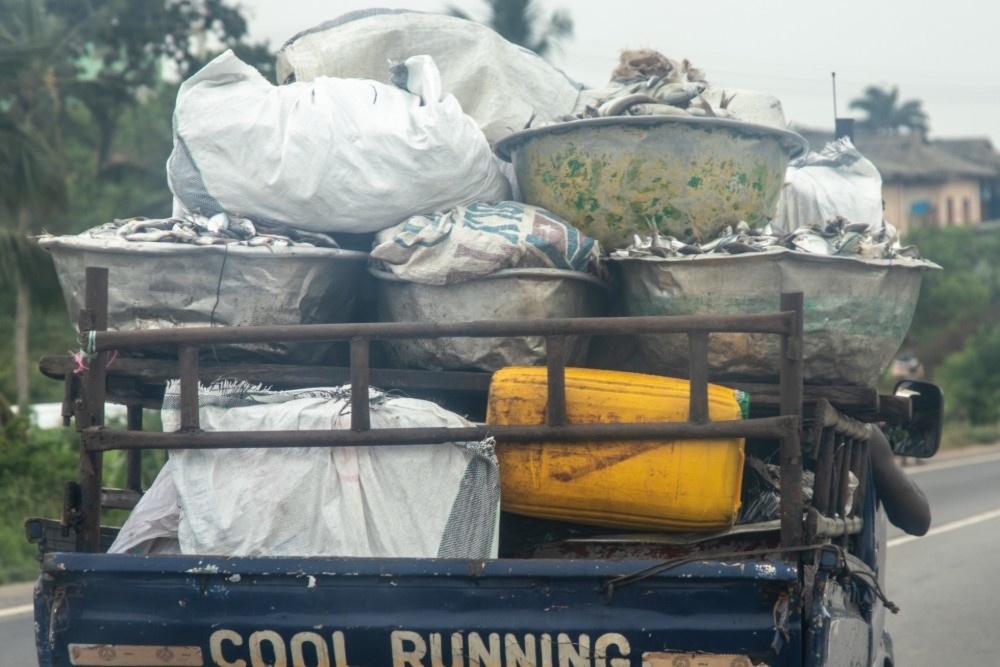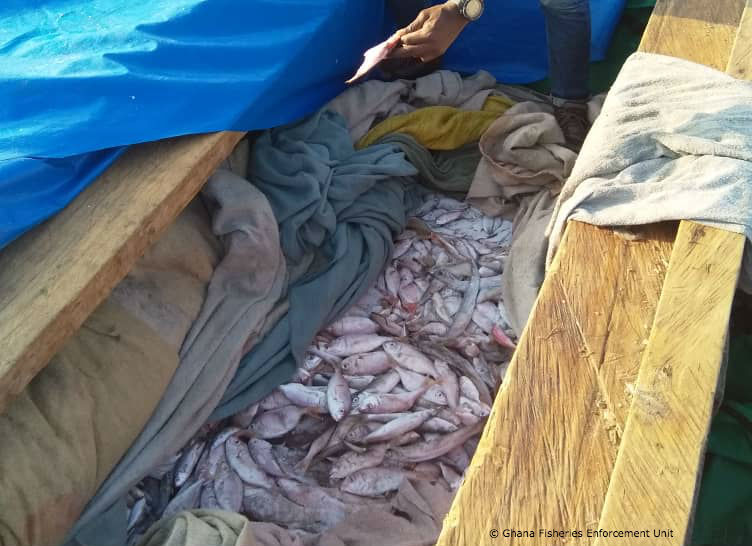
Ghana’s law is clear: Saiko fishing is illegal
‘Saiko trans-shipments’ – where industrial trawlers transfer fish at sea to specially adapted canoes to be landed – are very clearly illegal under Ghanaian law, an analysiscarried out by the Taylor Crabbe legal consultancy shows. The Environmental Justice Foundation (EJF), which commissioned the analysis, says it is publishing this to put the matter definitively to rest. The real issue, says EJF, is enforcing the law to bring an end to saiko, as the coronavirusspreads it is more important than ever that food security and livelihoods of coastal communities are protected.
‘Saiko’ is a severely destructive form of illegal fishing, in 2017 alone it took around 100,000 tonnes of fish, costing Ghana millions of dollars in revenue and threatening food security and jobs.
Industrial trawlers target fish specifically for saiko – not only the bottom-dwelling fish they are licensed to catch, but also juveniles and small pelagic fish. The small pelagics are known as ‘the people’s fish’ in Ghana due to their importance to coastal communities – because of saiko, they are under severe threat. Unless ambitious action is taken, scientists estimate that these stocks are in imminent danger of collapse.
The full force of the law is needed to bring this criminal trade to an end; however, some public discourse has appeared to throw doubt over whether saiko is illegal.
For instance, the Ghana Industrial Trawlers Association (GITA) wrote to the Ministry for Fisheries and Aquaculture Development in November last year saying that it would “suspend [saiko] trans-shipment at sea until further notice”.
Yet the legal analysis shows clearly that the trans-shipment of fish from industrial trawlers to canoes (known as ‘saiko’) has been rendered illegal since the passing of the implementing rules to the 2002 Fisheries Act (Act 625) - the 2010 Fisheries Regulations (LI 1968).
The 2010 Regulations expressly prohibit the trans-shipment of fish at sea from industrial trawlers to canoes. According to the legal analysis, the Minister, in exercising their power under the 2002 Act to enact implementing regulations on trans-shipment has ensured:
“Where the form of transhipment is explicitly barred [by the Regulations] then the [fisheries] commission and council are precluded from authorising or supervising such transhipments”
As such, the announcement from the trawl industry association to suspend saiko amounts to an effective admission of criminality by its membership. In addition, GITA cannot claim to have control over the situation. Since its declaration that it would “suspend” the already-illegal practice in November, almost 200 saiko canoes have landed at Elmina, according to monitoring by EJF.
In the 2020 budget statement, the government announced that it would stop saiko as part of efforts to save the fishing industry, committing to banning all domestic and international vessels found to be engaging in saiko from operating in Ghanaian waters. It must keep this vital pledge, says EJF, as well as immediately investigating all suspected cases of saiko fishing and prosecuting cases transparently through the court process.
EJF’s Executive Director Steve Trent said: “The world is facing a pandemic, and while it is absolutely vital that the government create a clear strategy for coronavirus, saiko cannot be allowed to continue while attention is diverted. These coastal communities need good nutrition and stable livelihoods more than ever in the face of threats such as coronavirus. Saiko is a serious threat to Ghana’s economy, driving poverty, hunger and unrest. Ghana’s ‘people’s fish’ are on the brink of collapse. We do not have time to waste discussing whether something that has been illegal for a decade is illegal – it is and all parties know this. This watertight legal analysis shows that saiko is illegal beyond all doubt. Now let us get on with the real, crucial action of eradicating this criminal trade once and for all.”
Notes for editors
Advice on coronavirus from the WHO and Harvard Medical School
Read the legal analysis and summary
Key facts:
- Section 139 of the 2002 Fisheries Act, Act 625, empowers the Minister to make implementing regulations concerning fish trans-shipments. The Minister has exercised this power by enacting the 2010 Fisheries Regulations, LI 1968. Regulation 33 of LI 1968 expressly prohibits the trans-shipment of fish from Ghanaian industrial vessels to canoes. The Regulations serve to limit the forms of trans-shipment that the Fisheries Commission may authorise and supervise under Section 132 of Act 625.
- Trans-shipment of fish from industrial trawlers to canoes (known locally as ‘saiko’) has been rendered illegal since the passing of LI 1968, whether or not carried out under supervision.
- An administrative directive or other decision purporting to ‘legalise’ saiko under supervision cannot be used to override clear provisions of law.
- The trawlers are owned almost exclusively by Chinese operators, who use Ghanaian ‘front’ companies to bypass laws forbidding any foreign ownership or control of industrial trawl vessels flying Ghana’s flag. EJF has revealed that over 90% of industrial trawlers licensed in Ghana are linked to Chinese ownership.
- New vessels have continued to arrive from China, despite a February 2012 moratorium on new industrial trawlers entering Ghanaian waters to address severe depletion of fish stocks. Of the 68 industrial trawl vessels licensed to fish in Ghana from March-June 2018, at least half were built in 2013 or later, after the moratorium on new or replacement vessels came into effect.
- Over 2 million people in Ghana rely on the country’s coastal fisheries for their food and income.
- Saiko catches in 2017 were worth US$ 40.6 - 50.7 million when sold at sea, and US$ 52.7 - 81.1 million when sold at the landing site.
- In 2017 industrial trawlers caught almost the same amount of fish as the entire artisanal sector, when illegal and unreported catches are taken into account. That is 76 trawlers catching approximately the same amount of fish as over 11,000 canoes or 100,000 fishers.
- While canoe fishing offers direct employment for around 60 fishers for every 100 tonnes of fish, saiko means only 1.5 jobs per 100 tonnes – 40 times fewer.
SIGN UP FOR OUR EMAILS AND STAY UP TO DATE WITH EJF

